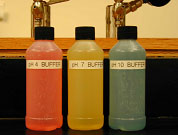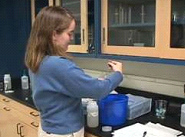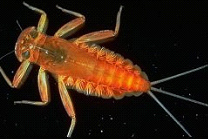Quality assurance and quality control should be essential components of any water quality monitoring program.
C-SAW can provide quality control technical assistance to selected watershed organizations across the state for water chemistry and macroinvertebrate identification. This will help ensure that the data collected by the watershed organizations through volunteer monitoring programs is of known quality.
Quality control technical assistance is limited by availability of resources. Upon receipt of a watershed organizations application, a C-SAW specialist will be in touch to discuss specific needs.
Water Analysis
Two types of quality control for water analysis are available through C-SAW: split sample analysis and blind sample analysis. The results obtained by the volunteer for a split sample will be compared with lab results from the Alliance for Aquatic Resource Monitoring (ALLARM ). The results from blind samples will be compared to the known values.
Based on the deviation from the laboratory or known value, results will be reported to the monitors.
Individuals who report poor agreement with the lab or known value will be provided with suggestions on how to improve sampling technique and encouraged to submit another sample for analysis.
Along with written feedback, individuals will also be encouraged to re-train through a combination of assistance from monitors within the same group, who achieved a closer agreement with the lab.
Split Sampling Analysis for Water

ALLARM will help groups to assure data quality through split sampling. In this program, volunteers will collect a sample, split it and conduct field measurements on this sample. The other split will be sent to ALLARM’s Community Aquatic Research Laboratory in Carlisle, PA.
In the lab, ALLARM will analyze the sample using the same equipment as the volunteer used and, where applicable, more sophisticated analysis methods. The split samples may be conducted across the state for any of the following parameters: pH, alkalinity, turbidity, conductivity, orthophosphate, total phosphorus, nitrate-nitrogen, sulfate, total iron, and dissolved iron.
ALLARM will provide collection bottles, containers for shipping samples, and pay for shipping costs.
Blind Sample Analysis for Water

Another quality assurance component of this project is to provide blind sample testing for field personnel. Under this component, samples with a known pH, specific conductance, or alkalinity will be prepared in the United States Geological Survey (USGS) laboratory in Ocala, Florida.
Using a standardized request form, volunteer monitors could request blind samples for their analysis. No information about the values of the constituents in question will be provided to the monitors. The monitors will analyze the blind samples and report the results. The USGS will provide follow-up.
Macroinvertebrate Identification
Stroud Water Research Center (eastern and central Pennsylvania) and the Conemaugh Valley Conservancy (western and central Pennsylvania) can provide a quality-control component for macroinvertebrate identification to monitoring groups across Pennsylvania.

Macroinvertebrate samples that are collected, identified, and counted by watershed monitors will be shipped to either the Stroud Center or CVC for verification of the field identifications.
Stroud Center or CVC entomologists will identify the organisms to the taxonomic level used by the watershed monitoring group, confirm the counts, and then report their findings to the field monitors. Specimens will be labeled and returned, with additional follow-up provided as needed.
